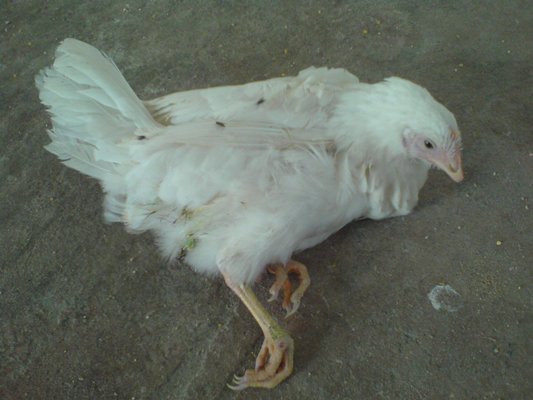

One of the most detrimental diseases a chicken can face is Marek’s disease, which is also known as fowl paralysis. Over the years this disease has been responsible for decimating flocks small and large, but it is most likely to affect chickens that are 4 months old or younger. This is due to an ability of older birds to develop a natural resistance to this disease through contact as they age.
Marek’s is named after Jzsef Marek, the Hungarian veterinarian and scientist who discovered it. This disease, which is caused by a herpesvirus, is characterized by unusual cellular growth in the central nervous system and peripheral nerves which can result in paralysis. Also possible are lesions both inside and outside of the body, in places such as on visceral organs, bodily tissues, and even areas of skin centered around feather follicles. Internally these lesions often occur on the lungs, spleen, kidneys, liver, testes, and ova where they may or may not cause noticeable swelling.
While Marek’s is extremely contagious, it cannot be spread from a mother hen to a chick through the egg. Instead it spreads between birds through infected bedding and dander expelled from the feather follicles of infected birds. This virus also exists in saliva and is suspected to enter the body of birds through inhalation via respiratory passages.
A vaccine against Marek’s was introduced in the 1970’s. It is administered to day old chicks and does offer some protection but it is not a guarantee against transmission. Instead, the vaccine works by reducing the amount of virus shed in the dander of birds. This in turn reduces the horizontal spread of Marek’s which is often enough to keep some birds safe, but the possibility of infection does remain.
Signs of infection primarily include paralysis and it is this that causes a lot of Marek’s deaths due to the inability of paralyzed chicks to eat and drink. When swelling occurs in the peripheral nerves, it may be noticeable as will tumors that are large in size. However, some birds will not show any clinical signs before succumbing.
While administering the vaccine will help combat this disease, the biggest advantage you can give your chickens is cleanliness. Practicing good coop and brooder biosecurity will go a long way as will being careful what you might bring back on your shoes and clothing from other flocks you may visit. Ultimately there is no cure for Marek’s, but survival is possible. Administer food and water to your chicks and do all you can to bolster immune systems such as through the availability of probiotics. The stronger your chickens’ immune systems, the better chance there will be that Marek’s is something they will live to put behind them.
 Contact Jaguza Support
Contact Jaguza Support